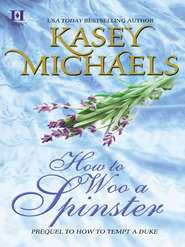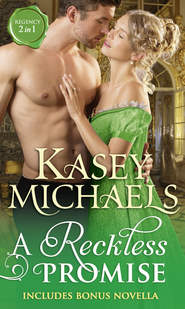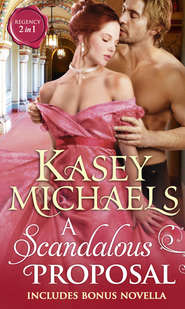По всем вопросам обращайтесь на: info@litportal.ru
(©) 2003-2025.
✖
The Chaotic Miss Crispino
Автор
Год написания книги
2018
Настройки чтения
Размер шрифта
Высота строк
Поля
“You see, the man probably didn’t much like it that an outsider had infringed on what the people of Milano consider theirs—the God-given right to tickle themselves by poking fun at all Timoteos. Oh, yes, signore. I was in the caffé long enough that night to hear almost everyone there take a turn at poking fun at il bello calzolaio—the beautiful shoemaker.”
“Ah,” Valerian said ruminatingly, interrupting her yet again. “That would explain the metal mallet, wouldn’t it? Oh, I’m sorry, Signorina—please, go on. I’m hanging on your every word, really I am.”
Allegra leaned back, making a great business out of crossing her arms beneath her breasts. “No. I don’t think so. My English is rusty since my madre’s death. You are making fun of me.”
Valerian inclined his head slightly, acknowledging her refusal. “Very well, signorina, if that’s what you have decided. I shan’t beg, you know.” So saying, he pushed his curly brimmed beaver down low over his eyes, showing all intentions of taking a nap as Tweed tooled the coach along the narrow, rutted roads.
He had only counted to twenty-seven when Allegra blurted, “Three nights after the incident in the caffè— with the help of his brother, Giorgio and his hairy spider cousin Alberto—Bernardo waits in the shadows for Erberto to emerge from the opera house after the performance.”
Her voice lowered dramatically. “They have, in their ridiculousness, begun the vendetta—a hunt for revenge—against my manager! Bernardo taps—boom!—on Erberto’s poor skull with that terrible mallet of his even as I watch, helpless.” She spread her hands, palms upward. “There is blood everywhere!”
“Erberto is dead? I had no idea, signorina,” he said, pushing up the brim of his hat, the better to see Allegra. Valerian had been reasonably impressed when Bernardo’s size (as well as the potential for mayhem provided by the metal mallet the man had carried), but he had not really believed the gorgeous young man capable of murder.
“You poor creature, to have been witness to a murder. And they are after you now, to kill you as well in order to cover their tracks. Please, tell me the whole of it.”
She quickly turned her head away, but not before Valerian had seen her smile. “No, no, signore, I won’t go on boring you with my tale of woe. Continue your nap, per favore.”
“Little Italian witch,” Valerian breathed quietly, knowing he had been bested by a mere child, and a female child at that. He sat up straight and offered his apology for teasing her, then begged her to continue with the story of the Timoteos.
“Erberto is not dead—more’s the pity. For even Dante’s terrible inferno is too good for him,” she went on, happy to speak now that she was sure she had Fitzhugh’s undivided attention. “Once he regained his senses the coward beat a hasty retreat—probably all the way to his uncle’s in Sicilia—leaving me alone to starve, for the night of the attack was also the final night of our engagement in Milano. He ran like a rabbit—and took every last bit of my wages with him! I spit on Erberto!”
“Not in my coach, you don’t!” Valerian cut in firmly, lifting one expressive eyebrow.
She shot him a withering glance. “Of course I won’t. Last night I only wished to shock you. You wanted me to be terrible, and I did not wish to be so unkind as to disappoint you. But you would spit on Erberto too, signore, if you knew the whole of it! Bernardo had seen me as I sat in the alley, you understand, holding that thankless Erberto’s broken head in my lap—and the fool fell fatally in love with me at that instant!”
“Then Bernardo really is in love with you?”
“Will you never stop asking silly questions and listen? Consider, signore. There I was, still in my stage costume—and a lovely costume it was, all red and glittering gold—sitting in the moonlight…my sapphire eyes awash with tears for the worthless Erberto…my glorious ebony tresses loosed about my shoulders…Erberto’s broken head cradled in my lap. I am very beautiful, you know, and I believe Bernardo saw me as a caritatevole Madonna.”
“A beneficent madonna? Really?” The child was a complete minx, and Valerian was having a very difficult time keeping his face expressionless as Allegra lifted a hand to push at her hair, striking a dramatic pose. “Don’t you think you might be overreacting—not to mention overacting?”
Her right hand sliced the air in a gesture that dismissed Valerian for a fool. “He follows me, does he not—dogging my every footstep these past six months so that I cannot find work, so that I cannot live without looking over my shoulder? He tells Giorgio and Alberto that, with Erberto gone, the vendetta is now directed at me, so that all three of them have abandoned the shoemaker shop to make my life a misery. They would not follow him else, you understand.
“But Bernardo has told me—once, when he almost caught me—that he wants only to marry me, to make up for the trouble he caused me by chasing Erberto away. Stupido! As if I should spend my life with that empty-headed creature and his beautiful, empty-headed children! No—I choose to run—to spend my life running, a wild pack of Timoteos forever barking at my heels!”
Valerian reached up a hand to straighten his cravat. “I see now that Duggy’s change of heart and imminent demise have come just in time for you, signorina. Considering all that you have told me, I’m surprised it took you so long to accept his offer, for I must admit I too can’t believe you have the makings of a dutiful shoemaker’s wife.”
Rather than become angry, Allegra appeared amused by Valerian’s opinion of her worth as a wife for Bernardo. “I should probably take his little metal mallet to his thick skull within a fortnight, signore,” she admitted with a grin. “But what is this—we are slowing down!”
She scooted over to the window to see that they were coming into the outskirts of a small town. “Ah, Empoli, and just in time! The inn I directed Tweed to take us to has the most delicious bruschetta in the region!”
“Bruschetta?” Valerian repeated, scowling. “That’s bread drenched in garlic, isn’t it?”
“It is nothing so simple. The bread is sliced thick and toasted ever so lightly, then rubbed most generously all over with none but the freshest garlic, olive oil, and salt. I adore it!”
“You will adore it from a distance today, signorina, or else ride up top with Tweed to the next posting inn,” Valerian warned her, his expression as stern as his voice. “I am entranced by Italy in general, but I have never learned to share your national love of garlic.”
Allegra’s chin jutted out as her breast heaved a time or two while she considered this ultimatum. It was raining, and had been raining ever since they had left the hotel. She had been an outside passenger in the wintertime enough to know that she did not wish to be one again. “I will have the minestrone, signore,” she said, giving in even though it pained her. “But you will not know what you have missed!”
“Oh, but I already know what I will miss, signorina,” he corrected her, reaching for the door as Tweed pulled the coach to a halt. “I will miss an afternoon in peace and quiet while you bear Tweed company—probably the last peace and quiet I shall have until we reach Brighton.”
As Valerian pushed down the coach steps, his back to Allegra, she almost gave in to the urge to lift her foot and push him headfirst through the door and out into the muddy inn yard.
“Ah, signore,” was all she said a moment later, comically rolling her big blue eyes as Valerian handed her down from the coach, “you must have a saint on your shoulder. You don’t know how lucky, how very lucky, you are!”
Valerian stared after her as she made her way confidently to the inn’s entrance, her dark head held high, her step fluidly graceful. The feeling that he was in some sort of unrecognizable danger from this small spitfire of a child was growing ever larger in his chest.
THEY REACHED NAPLES two days later, docking at the bottom of the Via Roma just at sundown, and proceeded directly to the rented villa of Mark Antony Betancourt, Marquess of Coniston, and his wife, Candice. The two were good friends of Valerian’s who, upon leaving Rome in October, had instructed him to visit them in their uncle’s villa in Naples after the New Year.
His fingers figuratively crossed that the couple would be in residence and not entertaining this evening, Valerian descended from the hastily rented carriage, bidding Allegra to remain behind while he assured himself that the Marquess was at home.
“Will your Marchesa of Coniston bid me to enter through the servants’ door as well?” Allegra asked, reluctant to move. Her stomach and legs had yet to acknowledge that she was back on dry land, because, as she had told Valerian, she didn’t have “sailor’s feet.”
She waited until he had walked away before adding peevishly, “Or do Englishwomen have better manners than Englishmen?”
Valerian, who had already mounted the three shallow stone steps to the front door, turned to smile back at her. “Candie stand on ceremony? I should think not, signorina. I’m sure she’ll make us both feel most welcome.”
Allegra sniffed and withdrew her head back into the carriage to await developments, as her pride still smarted from having to climb the back stairs at Valerian’s hotel in Florence. Her stomach grumbled as she waited for Valerian to summon her and she smiled, knowing that her appetite was returning to normal. With any luck there would be a good Neapolitan cook installed in the villa’s kitchen.
Five minutes passed before Valerian opened the door to the carriage and held out his hand for her to descend to the narrow flagway.
“I’m to go to the servants’ entrance?” she asked warily.
“The servants’ entrance?” exclaimed a female voice from the doorway. “Valerian, what have you been up to with this poor child? I’ve never before known you to be mean. Cuttingly sarcastic, yes, but never purposely mean. Oh, Tony, Uncle Max—just look at her! She’s beautiful! Have you ever seen anything so small as her waist?”
“And I don’t think it’s her waist we men are looking at, aingeal cailin, don’t you know,” replied a short, rather pudgy man in a curiously lilting baritone. “Reminds me a bit of your sister, Patsy. Isn’t that right, m’boyo?”
“I wouldn’t know, Max,” a third voice supplied, chuckling. “I’m a married man now, you know, and beyond such things.”
“Exactly like your sister, Patsy, my love,” the Marchioness answered, not sounding in the least upset. “I’ve always said I would gladly trade her this tiresome hair for her lovely, full bosom.”
Allegra, whose gaze had been concentrated on Valerian’s face as she tried to take some silent signal from him as to how to go on (a signal which, no matter how hard she looked, never came), lifted her head to confront the three people who had spoken of her as if she weren’t really there to listen. Almost instantly her mouth dropped open as she looked at the Marchioness of Coniston, a woman whose ethereal loveliness literally took her breath away.
The Marchioness was tall, and reed-slim, and her beautiful, pale-complexioned, heart-shaped face was animated by a lovely pair of slanted, lively sherry eyes. But it was her hair, a thick mane more white than blonde which fell nearly to her waist, that totally entranced Allegra. Until the Marchioness smiled, that is. Then Allegra was captured and won by the open friendliness in the young woman’s expression.
“Come inside, Signorina Crispino, do,” the Marchioness commanded, taking Allegra’s hand in hers. “Tony, Uncle Max, come along. Valerian looks as if he could use a tall glass of Chianti.”
“What a wonderful idea, Candie. And it’s a great thirst I’ve worked up this day myself, being good,” Maximilien P. Murphy answered brightly as the five of them headed inside, passing by a small group of interested servants.
Valerian slipped his arm around the older man’s shoulders as they walked across the marble foyer and into the main salotto. “It’s strange that you should mention being good, Max,” he said companionably, “for I’ve been wondering—how would you like to be bad for a while? Nothing terrible, you understand, just perhaps a momentary resurrection of the Conte di Casals, the Italian Count Tony told me you played to perfection in London. Would you impersonate him again—just long enough for the Conte to procure a passport for Signorina Crispino here?”
“That’s it? One tiny passport?” Maximilien answered, frowning. “That’s no harder than tripping off a log. Done and done, my boyo!”
“Valerian! Shame on you. And shame on you, Tony, my love, for telling tales out of school!” the Marchioness, overhearing, accused. “Uncle Max doesn’t do that sort of thing anymore, Valerian. You know that. After all, now that Tony and I have our sweet little Murphy, we want our son to get to know his uncle as a free man—and not just as a poor wretch we take oranges to at the local prigione.”
Allegra, who had been led to a chair by the Marquess, looked up at Lady Coniston in confusion. “Prison! Your uncle is a criminal?” she asked, biting her lip at the insult. “Scusi! I mean to say—” She turned to Valerian, who was now holding a wineglass and looking very much at home and at his ease. “Well, don’t just stand there! Help me, Fitzhugh, per favore! What did I mean to say?”
Lady Coniston promptly sat down beside Allegra and patted her hand. “Don’t apologize, my dear, for it was an honest mistake. You see, dearest Uncle Max and I traveled about the world for many years before Tony and I married, and we—well, you might say we indulged in a wee bit of stage-playing from time to time when the need arose.”











